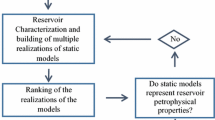Abstract
Waterflooding is a process where water is injected into an oil reservoir to supplement its natural pressure for increment in productivity. The reservoir properties are highly heterogeneous, its states change as production progresses which require varying injection and production settings for economic recovery. As water is injected into the reservoir, more oil is expected to be produced. There is also likelihood that water is produced in association with the oil. The worst case is when the injected water meanders through the reservoir, it bypasses pools of oil and gets produced. Therefore, any effort geared toward finding the optimal settings to maximize the value of this venture can never be over emphasized. Waterflooding can be formulated as an optimal control problem. However, traditional optimal control is an open-loop solution, hence cannot cope with various uncertainties inevitably existing in any practical systems. Reservoir models are highly uncertain. Its properties are known with some degrees of certainty near the well-bore region only. In this work, a novel data-driven approach for control variable (CV) selection was proposed and applied to reservoir waterflooding process for a feedback strategy resulting in optimal or near optimal operation. The results indicated that the feedback control method was close to optimal in the absence of uncertainty. The loss recorded in the value of performance index, net present value (NPV) was only 0.26%. Furthermore, the new strategy performs better than the open-loop optimal control solution when system/model mismatch was considered. The performance depends on the scale of the uncertainty introduced. A gain in NPV as high as 30.04% was obtained.















Similar content being viewed by others
References
A. S. Grema, Y. Cao. Optimization of petroleum reservoir waterflooding using receding horizon approach. In Proceedings of the 8th IEEE Conference on Industrial Electronics and Applications, IEEE, Melbourne, Australia, pp. 397–402, 2013.
M. Asadollahi, G. Naevdal. Waterflooding optimization using gradient based methods. In Proceedings of SPE/EAGE Reservoir Characterization and Simulation Conference, Society of Petroleum Engineers, Abu Dhabi, UAE, pp. 1–14, 2009.
J. D. Jansen, O. H. Bosgra, P. M. J. Van den Hof. Model-based control of multiphase flow in subsurface oil reservoirs. Journal of Process Control, vol. 18, no. 9, pp. 846–855, 2008.
F. A. Dilib, M. D. Jacksona. Closed-loop feedback control for production optimization of intelligent wells under uncertainty. SPE Production & Operations, vol. 28, no. 4, pp. 345–357, 2013.
D. R. Brouwer, J. D. Jansen. Dynamic optimization of waterflooding with smart wells using optimal control theory. SPE Journal, vol. 9, no. 4, pp. 391–402, 2004.
G. M. Van Essen, M. J. Zandvliet, P. M. J. Van den Hof, O. H. Bosgra, J. D. Jansen. Robust waterflooding optimization of multiple geological scenarios. SPE Journal, vol. 14, no. 1, pp. 202–210, 2009.
B. A. Foss, J. P. Jensen. Performance analysis for closedloop reservoir management. SPE Journal, vol. 16, no. 1, pp. 183–190, 2011.
Z. Tavassoli, J. N. Carter, P. R. King. Errors in history matching. SPE Journal, vol. 9, no. 3, pp. 352–361, 2004.
G. P. Li, J.He. Iterative learning control for batch processes based on support vector regression model with batchwise error feedback. In Proceedings of the 2nd International Conference on Intelligent Control and Information Processing, IEEE, Harbin, China, vol. 2, pp. 952–955, 2011.
D. R. Brouwer, J. D. Jansen, S. van der Starre, C. P. J. W. van Kruijsdijk, C. W. J. Berentsen. Recovery increase through water flooding with smart well technology. In Proceedings of SPE European Formation Damage Conference, Society of Petroleum Engineers Inc., The Hague, Netherlands, pp. 1–10, 2001.
S. Skogestad. Plantwide control: The search for the selfoptimizing control structure. Journal of Process Control, vol. 10, no. 5, pp. 487–507, 2000.
S. Skogestad. Near-optimal operation by self-optimizing control: From process control to marathon running and business systems. Computers & Chemical Engineering, vol. 29, no. 1, pp. 127–137, 2004.
I. J. Halvorsen, S. Skogestad, J. C. Morud, V. Alstad. Optimal selection of controlled variables. Industrial & Engineering Chemistry Research, vol. 42, no. 14, pp. 3273–3284, 2003.
L. J. Ye, Y. Cao, Y. D. Li, Z. H. Song. Approximating necessary conditions of optimality as controlled variables. Industrial & Engineering Chemistry Research, vol. 52, no. 2, pp. 798–808, 2013.
S. A. Girei, Y. Cao, A. S. Grema, L. Ye, V. Kariwala. Datadriven self-optimizing control. In Proceedings of the 24th European Symposium on Computer Aided Process Engineering, Budapest, Hungary, 2014.
H. Dahl-Olsen, S. Narasimhan, S. Skogestad. Optimal output selection for control of batch processes. In Proceedings of American Control Conference, IEEE, Seattle, USA, pp. 2870–2871, 2008.
W. H. Hu, L. M. Umar, G. X. Xiao, V. Kariwala. Local self-optimizing control of constrained processes. Journal of Process Control, vol. 22, no. 2, pp. 488–493, 2012.
L. J. Ye, V. Kariwala, Y. Cao. Dynamic optimization for batch processes with uncertainties via approximating invariant. In Proceedings of the 8th IEEE Conference on Industrial Electronics and Applications, IEEE, Melbourne, Australia, pp. 1786–1791, 2013.
A. S. Grema, Y. Cao. Optimal feedback control of reservior waterflooding. In Proceedings of International Conference on Automation and Computing, Bedford shire, UK, pp, 2014.
SINTEF Applied Mathematcics, [Online], Available: http://www.sintef.no/Projectweb/MRST/, June 28, 2015.
Acknowledgement
We acknowledge SINTEF for providing free licence of the software, Matlab reservoir simulation toolbox.
Author information
Authors and Affiliations
Corresponding author
Additional information
This work was supported by Petroleum Technology Development (PTDF), Abuja.
Rights and permissions
About this article
Cite this article
Grema, A.S., Cao, Y. Optimal feedback control of oil reservoir waterflooding processes. Int. J. Autom. Comput. 13, 73–80 (2016). https://doi.org/10.1007/s11633-015-0909-7
Received:
Accepted:
Published:
Issue Date:
DOI: https://doi.org/10.1007/s11633-015-0909-7




